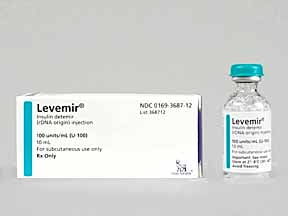
Levemir Coupons & Savings Card – Discount Prices from $92.96
My prescription
Edit
10ML of 100UNIT/ML, Levemir (1 Vial)
Select pharmacy

CVS
$127.58
COUPON PRICE
Walmart
$92.96
COUPON PRICE
Walgreens
$103.95
COUPON PRICE
Albertsons
$118.80
COUPON PRICELevemir savings card
Show this card to your pharmacist
Walmart
$92.96
BIN
ID
PCN
GRP
019876
LH181DE517
CHIPPO
LHX
Powered by
Related insulins prescriptions
More prescriptions for diabetes type 2
Related insulins prescriptions
More prescriptions for diabetes type 2
Price history for Levemir
1 Vial, 10ML of 100UNIT/ML
Average retail price for Levemir
Average SaveHealth price for Levemir
Our price history data is based on aggregated prescription data collected from participating pharmacies in America. Our prescription data updates daily to reflect the latest price changes. If you notice a missing data point, it means there wasn't sufficient data available to generate a monetary value for that date.
*Retail prices are based on pharmacy claims data, and may not be accurate when we don't have enough claims.
Levemir dosage forms
Dosage Quantity Price from Per unit 10ML of 100UNIT/ML 1 Vial $92.96 $92.96 10ML of 100UNIT/ML 2 Vials $204.91 $102.45 10ML of 100UNIT/ML 3 Vials $316.85 $105.62
| Dosage | Quantity | Price from | Per unit |
|---|---|---|---|
| 10ML of 100UNIT/ML | 1 Vial | $92.96 | $92.96 |
| 10ML of 100UNIT/ML | 2 Vials | $204.91 | $102.45 |
| 10ML of 100UNIT/ML | 3 Vials | $316.85 | $105.62 |
What kind of insulin is Levemir?
Levemir is a long-acting insulin. It is used to help control blood sugar levels in individuals with diabetes by providing a steady level of insulin throughout the day and night.
Why did Levemir get discontinued?
Levemir has not been discontinued. It is still available as a long-acting insulin used to help control blood sugar levels in individuals with diabetes. If there are any concerns about availability, it is advisable to check with local pharmacies or healthcare providers for the most current information.
Is Levemir short or long acting?
Levemir is a long-acting insulin.
Why are insurance companies not covering Levemir?
Insurance coverage for medications like Levemir can vary based on several factors. Insurance companies may not cover Levemir due to formulary restrictions, where they prefer other insulin products that are more cost-effective or have negotiated better pricing. Additionally, coverage decisions can be influenced by clinical guidelines, availability of generic alternatives, or the specific plan's benefits. Patients are encouraged to check with their insurance provider for details on coverage and potential alternatives.
What are they replacing Levemir with?
Levemir, an insulin detemir product, is not being universally replaced by a single alternative. However, other long-acting insulins such as insulin glargine (Lantus, Basaglar, Toujeo) or insulin degludec (Tresiba) are commonly used as alternatives. The choice of replacement depends on individual patient needs and physician recommendations.
